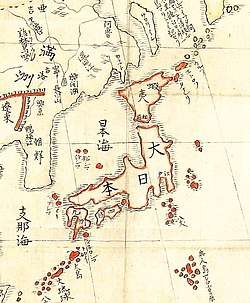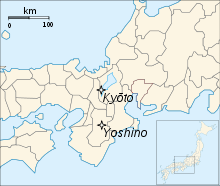Kentoku
Kentoku (建徳) was a Japanese era of the Southern Court during the Era of Northern and Southern Courts after Shōhei and before Bunchū, lasting from July 1370 to April 1372.[1] Reigning Emperors were Chōkei in the south and Go-En'yū in the north.
| History of Japan |
|---|
 |
Nanboku-chō overview
During the Meiji period, an Imperial decree dated March 3, 1911 established that the legitimate reigning monarchs of this period were the direct descendants of Emperor Go-Daigo through Emperor Go-Murakami, whose Southern Court (南朝, nanchō) had been established in exile in Yoshino, near Nara.[2]
Until the end of the Edo period, the militarily superior pretender-Emperors supported by the Ashikaga shogunate had been mistakenly incorporated in Imperial chronologies despite the undisputed fact that the Imperial Regalia were not in their possession.[2]
This illegitimate Northern Court (北朝, hokuchō) had been established in Kyoto by Ashikaga Takauji.[2]
Change of era
Events of the Kentoku Era
Northern Court Equivalents
- Ōan
Notes
- Nussbaum, Louis-Frédéric. (2005). "Kentoku" in Japan encyclopedia, p. 510; n.b., Louis-Frédéric is pseudonym of Louis-Frédéric Nussbaum, see Deutsche Nationalbibliothek Authority File Archived 2012-05-24 at Archive.today.
- Thomas, Julia Adeney. (2001). Reconfiguring modernity: concepts of nature in Japanese political ideology, p. 199 n57, citing Mehl, Margaret. (1997). History and the State in Nineteenth-Century Japan. p. 140-147.
References
- Nussbaum, Louis Frédéric and Käthe Roth. (2005). Japan Encyclopedia. Cambridge: Harvard University Press. ISBN 978-0-674-01753-5; OCLC 48943301
- Titsingh, Isaac. (1834). Nihon Odai Ichiran; ou, Annales des empereurs du Japon. Paris: Royal Asiatic Society, Oriental Translation Fund of Great Britain and Ireland. OCLC 5850691
External links
- National Diet Library, "The Japanese Calendar" -- historical overview plus illustrative images from library's collection
| Preceded by Shōhei |
Era or nengō Kentoku 1370–1372 |
Succeeded by Bunchū |
